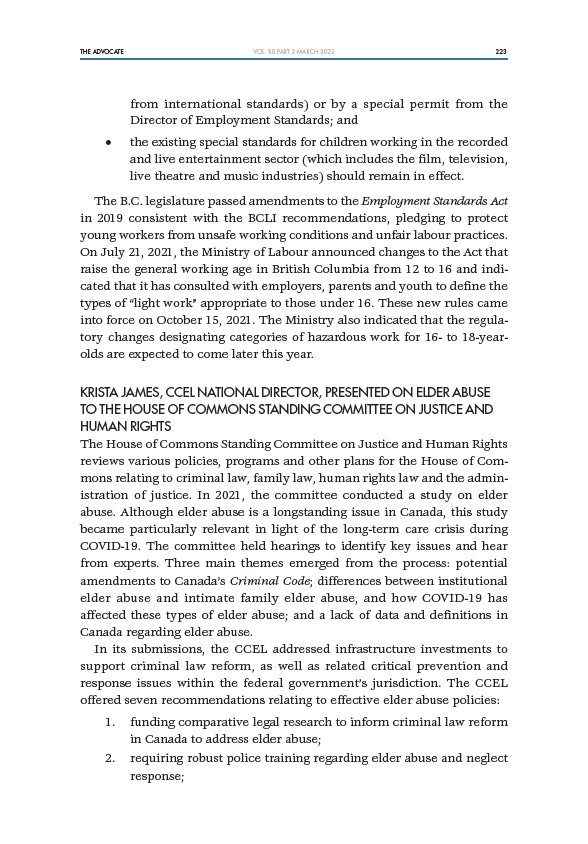
THE ADVOCATE 223
VOL. 80 PART 2 MARCH 2022
from international standards) or by a special permit from the
Director of Employment Standards; and
• the existing special standards for children working in the recorded
and live entertainment sector (which includes the film, television,
live theatre and music industries) should remain in effect.
The B.C. legislature passed amendments to the Employment Standards Act
in 2019 consistent with the BCLI recommendations, pledging to protect
young workers from unsafe working conditions and unfair labour practices.
On July 21, 2021, the Ministry of Labour announced changes to the Act that
raise the general working age in British Columbia from 12 to 16 and indicated
that it has consulted with employers, parents and youth to define the
types of “light work” appropriate to those under 16. These new rules came
into force on October 15, 2021. The Ministry also indicated that the regulatory
changes designating categories of hazardous work for 16- to 18-yearolds
are expected to come later this year.
KRISTA JAMES, CCEL NATIONAL DIRECTOR, PRESENTED ON ELDER ABUSE
TO THE HOUSE OF COMMONS STANDING COMMITTEE ON JUSTICE AND
HUMAN RIGHTS
The House of Commons Standing Committee on Justice and Human Rights
reviews various policies, programs and other plans for the House of Commons
relating to criminal law, family law, human rights law and the administration
of justice. In 2021, the committee conducted a study on elder
abuse. Although elder abuse is a longstanding issue in Canada, this study
became particularly relevant in light of the long-term care crisis during
COVID-19. The committee held hearings to identify key issues and hear
from experts. Three main themes emerged from the process: potential
amendments to Canada’s Criminal Code; differences between institutional
elder abuse and intimate family elder abuse, and how COVID-19 has
affected these types of elder abuse; and a lack of data and definitions in
Canada regarding elder abuse.
In its submissions, the CCEL addressed infrastructure investments to
support criminal law reform, as well as related critical prevention and
response issues within the federal government’s jurisdiction. The CCEL
offered seven recommendations relating to effective elder abuse policies:
1. funding comparative legal research to inform criminal law reform
in Canada to address elder abuse;
2. requiring robust police training regarding elder abuse and neglect
response;